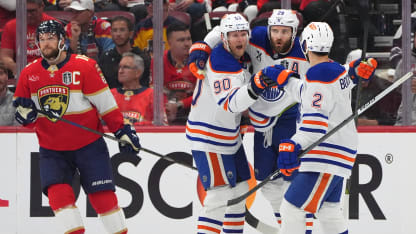Oilers’ Resilience and Maturity Key to Bouncing Back After Tough Game 3 Loss
The Edmonton Oilers find themselves in a familiar position after a disheartening Game 3 loss, a scenario that tests their resilience, mental toughness, and ability to respond under pressure. While the defeat stings, the true measure of this team will be how they regroup, adjust, and fight back in the next game. History has shown that championship-caliber teams are defined not by their setbacks but by their responses—and for the Oilers, this moment presents an opportunity to prove they have the maturity and composure to overcome adversity.
Playoff hockey is as much a mental battle as it is a physical one. The Oilers have faced their share of challenges this postseason, but Game 3’s loss cuts deeper because of the stakes. Whether it was a lapse in defensive structure, an inability to capitalize on scoring chances, or simply being outworked by the opposition, the game revealed flaws that must be addressed. However, the players and coaching staff have repeatedly emphasized their belief in the group’s ability to rebound.
Resilience isn’t just about bouncing back—it’s about learning, adapting, and executing better in the next game. The Oilers have veterans like Connor McDavid, Leon Draisaitl, and Ryan Nugent-Hopkins who have been through playoff battles before. Their leadership will be crucial in ensuring the team doesn’t dwell on the loss but instead focuses on the adjustments needed to even the series.
Every loss in the playoffs carries lessons, and the Oilers must quickly diagnose what went wrong in Game 3. Was it turnovers in the neutral zone? A lack of net-front presence? Poor special teams execution? Identifying these issues is the first step toward fixing them.
Head coach Kris Knoblauch will likely emphasize tightening defensive gaps, improving breakouts, and reigniting the offensive pressure that has made the Oilers so dangerous. The team’s ability to make in-game adjustments has been a strength this season, and now they must apply that same adaptability between games.
Great teams are led by players who elevate their game when the stakes are highest. McDavid and Draisaitl have shouldered the offensive load throughout the playoffs, but their response after a loss will set the tone for the entire team. Both have shown in the past that they can dominate games when their backs are against the wall, and the Oilers will need that kind of performance in Game 4.
Beyond the stars, veterans like Zach Hyman, Mattias Ekholm, and Corey Perry bring a wealth of playoff experience. Perry, in particular, knows what it takes to win deep in the postseason, and his presence in the locker room could be pivotal in keeping the team focused.
A critical factor in the Oilers’ ability to rebound will be the performance of Stuart Skinner (or their goaltender, depending on the series). Goaltending can erase mistakes and provide the foundation for a comeback, and a strong outing in Game 4 would go a long way in settling the team’s nerves.
Defensively, the Oilers must limit high-danger chances and support their netminder with better puck management. Players like Darnell Nurse and Evan Bouchard will need to be sharper in their own zone, ensuring that breakdowns don’t lead to easy opposition goals.
One of Edmonton’s biggest weapons has been its lethal power play, but if it goes cold at the wrong time, it can swing momentum in the opponent’s favor. In Game 4, the Oilers must capitalize on their opportunities with the man advantage. Even a single power-play goal can shift the momentum of a game—and potentially the series.
Playoff hockey is an emotional rollercoaster, and the Oilers must avoid letting frustration dictate their play. Whether it’s a bad call, a missed chance, or an opponent’s momentum swing, staying composed will be key. Maturity means not retaliating with unnecessary penalties, not forcing plays that aren’t there, and sticking to the system even when the game feels like it’s slipping away.
This isn’t the first time the Oilers have faced adversity. Throughout the season and in previous playoff runs, they’ve shown an ability to reset after tough losses. Last year’s playoffs demonstrated that this team can battle through setbacks, and this year’s group is even deeper and more experienced.
The belief in the locker room will be that one loss doesn’t define a series. If the Oilers can channel their frustration into a more disciplined, determined effort in Game 4, they can regain control.
Game 3’s loss is a setback, but not a death sentence. The Oilers have the leadership, skill, and resilience to bounce back. If they can channel their maturity into a composed, relentless effort in Game 4, they can swing the momentum back in their favor.
The playoffs are about responding to adversity, and now is the time for the Oilers to show they have the mental toughness of a championship team. The next game will reveal whether this group can rise to the occasion—and if they do, this loss will be remembered only as a stepping stone to greater success.



